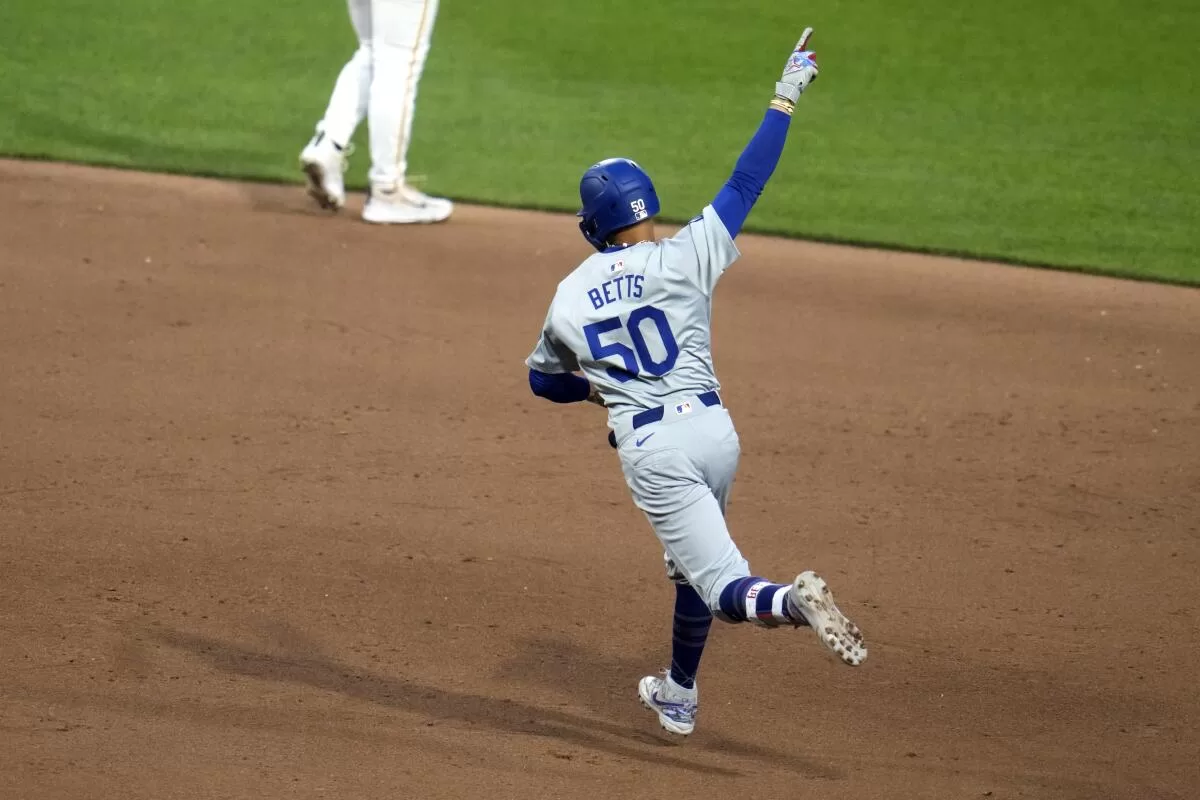After a blistering start to the season offensively, Dodgers star Mookie Betts had cooled in recent weeks. Entering Thursday, Betts was in a one-for-25 slump. He was batting .236 with a mediocre .685 OPS in his last 32 games since April 29. His underrated power had disappeared, too, after hitting only four home runs in his previous 54 games.
So, Roberts was asked Thursday afternoon, was Betts’ workload as an everyday shortstop — the position he switched to this spring for the first time in his MLB career — affecting his production at the plate?
No, the manager claimed, adamantly.
“I think the lazy, easy answer is [that his recent struggles are] because of his workload at shortstop,” Roberts bemoaned. “I think this is one of those situations where the world would wait for Mookie to start not staying hot, and say that’s why.”
A few hours later, Betts quieted that narrative — for one night, at least.
In an 11-7 win that kept the Dodgers from getting swept by the Pittsburgh Pirates, Betts led the way offensively by recording two hits, reaching base four times and, most of all, smacking a three-run home run in a six-run fifth inning, helping the Dodgers pull away in what was a back-and-forth battle early on.
Thursday was the kind of highlight performance Betts provided often in the season’s opening weeks, when he batted .368 in March and April while playing full-time at shortstop for the first time as a professional.
Back then, Betts’ two-way excellence was awe-inspiring. It was a testament to his defensive versatility, after spending most of his MLB career as a Gold Glove right fielder, as well as his ability to handle the increased workload that came with re-learning such a pivotal position.
“I’m at a loss for words,” Roberts said recently of Betts’ switch to shortstop. “I don’t think it’s ever been done at this level, for this level of player.”
(Gene J. Puskar / Associated Press)
But, as Betts’ numbers tailed off, speculation started to spur. That the demands of playing shortstop were diminishing his offensive productivity. That his countless hours of pregame defensive drills were taking a toll on his body. That his positional change was having the kind of unintended side effects some fans (and Dodgers officials) feared when he first made the switch.
Even a former MVP, the thinking went, could only handle so much for so long.
When asked about that theory Thursday, however, Roberts scoffed.
That “narrative,” Roberts said, overlooked the fact that Betts has long been prone to cold stretches as a hitter. It discounted a simpler explanation that his swing was just a little off, leading to him “missing some pitches” he would usually punish.
“I just want time to pass,” Roberts said, before putting any blame on Betts’ shortstop workload. “I trust his work. I know he’s gonna hit. He’s gotten a lot better at shortstop. And we still got a first-place ball club. He’s still a pretty good player.”
That much, Betts backed up Thursday.
Betts led the game off with a single, sparking a four-run first inning that was highlighted by Freddie Freeman’s three-run blast, his eighth homer of the year.
The Pirates (29-33) eventually came back, tagging Dodgers pitcher Walker Buehler with four runs (three earned) in a start marred by bad defense — the Dodgers committed two errors behind Buehler, and let three other playable balls result in hits — and a game-tying two-run homer from Nick Gonzales in the bottom of the third.
But then, Betts helped the Dodgers (39-25) surge back in front for good.
Dodgers starting pitcher Walker Buehler delivers during the second inning Thursday against the Pirates.
(Gene J. Puskar / Associated Press)
In a six-run fifth inning that also included a solo home run from Teoscar Hernández (his 13th of the season, fifth-most in the National League), an RBI double from Kiké Hernández and a run-scoring error on a stolen base attempt, Betts provided the exclamation point.
In a 1-and-1 count against Pirates reliever Ben Heller, Betts squared up a sinker over the heart of the zone. The three-run blast traveled 410 feet, clearing the wall in straightaway center. And as Betts rounded the bases, coolly celebrating his 10th homer of the season with a point to the team’s dugout and bullpen, the futility of his recent struggles quickly faded from memory.
Of course, it will take more than one big game to negate Betts’ shortstop narrative completely.
The 31-year-old is still taking as many daily pregame grounders as any infielder on the team. He is still learning the intricacies of being an everyday shortstop (something that was apparent Thursday on a second-inning throwing error and a couple other misplayed grounders). He is still trying to prove that he can not only handle shortstop on an everyday basis, but sustain elite-level production with the bat in the process.
It’s not an easy task.
But, in the Dodgers’ view, it’s hardly impossible, either. Especially for a player as uniquely talented as Betts.
“When you’re in it, when you’re scuffling, you don’t feel too awesome,” Roberts said. “But he is self-dependent. He’s gonna be just fine. I’m not worried about him.”
